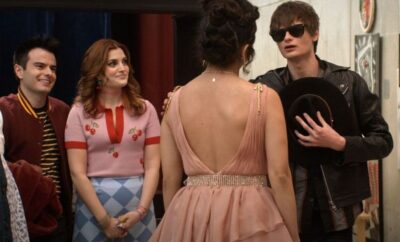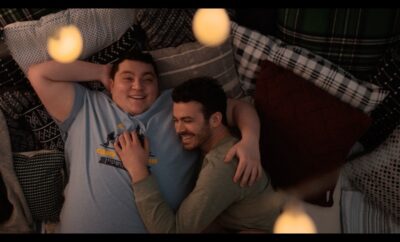
Movie Reviews
All About My Mother – Outfest
By: Taylor Gates
The “All About My Mother” short program was all about the mama bears – ones who identify as queer, ones with queer children who are desperate to be “wok,” and ones with queer children who just needed a little bit of time to come around. The mothers in these films were a diverse set: there were traditional Indian-American moms, overprotective South Korean ones and even an adoptive Pakistani mother. Whether they were outrageously funny, unbelievably stubborn or somewhere in between, every lady ferociously loved their child in their own unique way.
Are We Good Parents?
Are We Good Parents? is without a doubt one of the most laugh-out-loud funny shorts that premiered at Outfest. Its concept is simple – Lauren (Tracie Thoms) and Bill (Sean Maguire) have a meltdown when their daughter Maya (Gabrielle Skye Goodman) announces her plans to go to the homecoming dance with Ryan, as they always assumed she was gay.
After Maya leaves for school, Lauren and Bill talk things out. Is Maya gay after all? Are they bad parents for thinking that? Is Maya just afraid to come out to them? If so, why? One of the most hilarious moments comes when they’re brainstorming ways they could’ve forced heterosexuality down her throat. Maybe it’s because Maya has been around Bill’s ultra-traditional sister and brother-in-law too much. Maybe it’s because Bill watches too much football. Maybe it’s because they haven’t made Maya do the customarily masculine chore of taking out the trash.
Thoms and Maguire, both seasoned dramatic actors, let loose to hysterical effect, easily riffing off each other and clearly having a lot of fun getting worked up and blowing things out of proportion with the quick, witty dialogue. Up-and-comer Goodman holds her own in the trio as the calm voice of reason. Though I predicted the twist at the end, it didn’t lessen the enjoyment when it finally came.
Creator Bola Ogun is still relatively new to the writing and directing world, but she has a voice that’s definitely worth watching. The mix of fresh blood between her and Goodman as well as the somewhat surprising turns from Thoms and Maguire combined to form something really special here. If you like fresh comedies and feel-good family dynamics, you’re not going to want to miss this sweet, original gem.
Rani [Urdu with English subtitles]
Directed by Hammad Rizvi, the short film Rani is a haunting and moving tale. Shunned by many for being transgender, a woman named Rani (Kami Sid) scrapes by selling toys on the streets of Pakistan and living in a small house with her mother (Hina Pathani). Rani’s entire life is changed in an instant when she spies a baby in an abandoned crib on the side of the road. Rani makes the snap decision to take the child and raise it as her own, much to her own mother’s disapproval at first.
Two words I would use to describe Rani would be quiet strength. Sid plays the character with both a soothing calmness and iron resolve to do what is right. Despite all the abuse and jeering Rani is forced to face, she still chooses love and does not allow them to break her naturally kind and caring spirit.
The fact that the ending offered a surprising amount of hope for Rani was touching, leaving viewers on a feel-good note. When Rani goes to take the child to an orphanage, convinced she can’t be the one to raise her, an employee at the adoption agency immediately recognizes Rani’s beautiful, nurturing spirit and offers her a job there.
Rizvi manages to shine a light on not one, not two, but three marginalized groups within this 1fourteen minute film: the transgender community, the Pakistani population and those living in poverty. Rizvi actually shot the film on the streets of Pakistan, which gave it all an immersive, raw feel. Rani manages to be sophisticated and gorgeous, its final message of optimism and goodness refreshingly uplifting.
Darío [Spanish with English subtitles]
Darío (Javier Alberto Bula García), a teenage boy from Colombia, has a passion for dance. However, he is shamed by his mother (Norelis Nieves Cardona), who harshly encourages him to stop wasting time with extracurriculars and get a real job. Dario attempts to compromise, both working at his uncle’s store while secretly attending dance rehearsals as well. His two worlds collide when dance festival day arrives. Will his mother finally accept Darío for who he is or will he be shunned for his decision?
The young actors do a fine job. Dario realistically portrays being torn between following your head or our heart. García’s scene partners, especially the ones who play his best friend and uncle, do great – especially in the comedic scenes. Dario’s friend is a firecracker and his uncle is hilariously over Dario’s typical teenage attitude.
Visually, the film is stunning. The dance rehearsals on the basketball court are nicely choreographed, the setting feeling very high school. The last scene of the festival is lively, full of upbeat music and bright colors.
Ultimately; however, while it’s a decent film it’s not the most memorable. The plot feels a little tired and done-before – a bit Disney Channel. Manuel Kinzer and Jorge A. Trujillo Gil’s script and direction just doesn’t infuse Darío with nearly as much personality that some of the other teen-centric shorts have (like Izzy and the MXfits) or as much depth as some of the name-titled shorts (like Rani), causing it to get a little lost in the background.
Between Us Two
Between Us Two is not the traditional short film. With a run time of only five minutes, the film breaks the traditional narrative structure to make a more artistically experimental piece. Creator Tan Wei Keong tries to imagine what his mother would say about him marrying a man if she were still alive.
Keong uses a collage of artifacts and forms to accomplish this task. Employing a hybrid of animation, personal narration and cameo soundbites from people like his husband, the result is bittersweet. Although Keong’s mother will never know he married, and he’s not completely sure she’d be okay with it, the overall tone is one of hope.
Keong doesn’t shy away from his own personal style, which gives it rich texture and character. Visually, Keong plays with movement and integrates both English and Korean to tell this deeply personal tale.
Uninvited [Korean with English subtitles]
I found Uninvited to be one of the strongest films of the festival. A tight cast of only three characters, the film packs together a lot of layers and beats in a mere twenty minutes. When Jungho’s (Sum Lee) mother (Keunyoung Kim) pays him a surprise visit at his apartment in Seoul, he must frantically try and erase all traces of his boyfriend Jae-ik (Jinseung Moon) from the space in order to keep his sexuality a secret.
The film beautifully encompasses the theme of connection, asking difficult, complicated questions. Can we truly connect if we are not honest with one another? Is it better to take a risk by reaching out or should you hang back, waiting for the other person to make the first move?
Uninvited has familiar character archetypes – the nagging mother, the inconvenienced adult son – but they never feel stale under writer/director Seung Yeob Lee. His slow, patient pace helps us sympathize with Jungho, but by seeing everything from his mother’s perspective for the majority of the time it is obvious how much she cares for her son. Lee smartly plants small, subtle hints, such as milk in the fridge (which Lee never drinks) and an extra toothbrush on the bathroom sink, which makes the film feel nuanced.
The cinematography is distinct and pleasant. Creams, browns and blues dominate the screen from the apartment decor, the ambiance of the cafe next door and even the costuming. The lighting is cheery and airy, giving the story room to breathe.
Though the ending is satisfying, there’s a wonderful Easter egg/blink-or-you’ll-miss-it moment during the credits you’ll definitely want to see: at the end of the film Jungho’s mother gives him a “tacky” photo frame as a housewarming gift. The pictures rotate out as the credits roll, the last one being a photo of Jungho, his mother and Jae-ik all together…all smiles.
Khol (Open)
When Vijay’s (Shawn Parikh) homophobic father dies, he returns home from the big city for the funeral. Vijay then finds himself back in his childhood house with his mother Ranjan (Ana Khaja) and sister Vidya (Sarayu Blue, who recently had a fantastic turn in Blockers).
Parikh and Alessandro Nori’s writing combined with Faroukh Virani’s stylish direction truly makes this this trio feel like a family unit. For the most part, they deal with pain in the same passive-aggressive, silent way by hiding behind biting humor to cope. There’s one particularly affecting moment when Vijay and Vidya are going in hard on their deceased father during dinner, but instead of chastising them Ranjan joins in on the roast.
Vijay juggles the familiar struggle of transitioning from his open life in the city hooking up with random guys to the judgment-filled attitude his small, traditional family and town. He manages this feat all the while knowing approximately two openly LGBTQ+ people within a thirty-mile radius.
During a Q&A session after the showing, the filmmakers behind Khol (Open) stressed how important it was to them to authentically show the way Indian-American families speak to each other and express various emotions. It’s clear that the small, masked olive branch Ranjan extends at the end contains so much more meaning than what’s said on the surface. The short contains a rare amount of both craft and depth while showcasing gorgeous traditions.
For Nonna Anna
Directed by Luis De Filippis, For Nonna Anna is a quiet and affecting film showcasing the relationship between a young trans girl and her elderly Italian grandmother. When Chris’ (Maya Henry) mother (Anna Peccia) must leave for the night, Chris is put in charge of caring for her Nonna (Jacqueline Tarne). Chris skirts around her for most of the night until circumstances force her out of her comfort zone in order to help her Nonna (Italian for “grandma”).
For Nonna Anna is unflinchingly, exquisitely raw. Chris’ fears that her Nonna does not accept her shine through in every look she gives or movement she makes without ever having to vocalize them. Small actions, such as Chris watching a home video of her trying on her Nonna’s clothes as a child and donning one of her bras again once Nonna is asleep, are what key us in to the fact that Chris is transgender.
Besides showcasing a transgender character, For Nonna Anna gives a voice to the elderly, too. Nonna cannot take care of herself anymore, but she can still show love in her own way and has just as much dignity as any other person.
The most goosebump-inducing moment is the movie’s climax when Chris is forced to be vulnerable and lay it all out. When Nonna wets the bed overnight, Chris has difficulty telling her that she needs to undress to get a shower. Finally, she makes the snap decision to show Nonna by undressing herself, exposing her body, knowing full well that her grandmother might react with confusion or disgust. Instead, Nonna just smiles at her, giving her permission to be herself.
Filippis’ penchant for silence and realism will keep viewers holding their breaths. The soft but bright colors and lighting match the film’s overall mood. The film tells a unique story of unexpected solidarity and acceptance, daring you not to tear up.





You must be logged in to post a comment Login